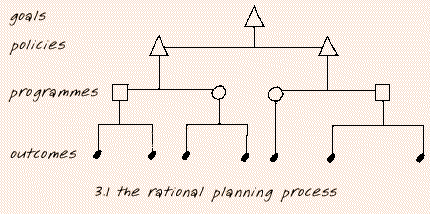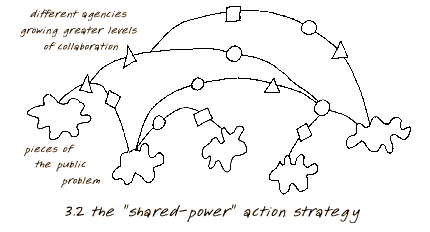|
Co-ordination, Collaboration and Co-operation the challenges of working together |
|
So how do you get things done? |
|
THIS MAY ALL be very interesting to think about ... but how does it help us get things done?
Well, the "in-charge" model has a very clear and pragmatic way of addressing the task: it is often called the "rational planning process". This is an action strategy that rests on a very clear concensus on the goals ... we all know what the mission is, why we are there, how we are going to get on with it, and how we will measure the results. A picture of the rational planning model looks something like this :
This planning model goes from "goals" to "policies" to "programmes" to "outcomes". We could quibble over the terms ... but this is a pretty standard framework for strategic planning. But there is an alternative view which is no less professional in its approach. This is the "shared-power" planning model which starts out by not assuming that consensus exists over the goals. I have found this to be a critical insight in understanding how to develop co-operation between groups: do not start by assuming that we have to see things in the same way. In the "shared-power" world there are almost always conflicts between the different groups involved conflicts in terms of how we define what a success is, conflicts on how we define the means for collaborative action, how we define the culture and philosophy of the programmes, conflicts over timing ... and conflicts over how many of the organisations involved enjoy greater advantages and privileges than the other groups. How we get things done here is through relationships. We grow these relationships from the ground up by building ever more general connections of trust and consensus between the main players. In this model, we have the maturity to say to each other: "I might not agree with you on everything, but I do agree with you about this bit. So lets get on with that..." A "shared-power" action strategy might look like this:
The logic and reasoning behind the rational planning model is deductive. You can trace your choices back to an origin. With deductive logic, you state the premise and your actions lead progressively to a conclusion. The whole system moves from the general to the particular. In contrast, the logic and reasoning behind the "shared-power" model is inductive. Its going completely in the reverse direction ... as it moves from the particular to the general. The strategies at work here are about starting from the particular choices and shared actions you can agree on right now ... and letting greater and greater levels of agreement unfold as relationships grow. Trust grows through small acts of collaboration. This model is a strategy for how "the big picture" is addressed by biting through the little pictures first. In a "shared-power" environment, we dont sign up to our "mission" before we start to work together. We grow the mission together, being flexible and open to changes as we co-operate. In an "in-charge" model might talk about goals but in a "shared-power" world the talk is more about trajectories. How many of us have been in organisations with mission statements and goals that sit on the wall ... and two years down the track it is obvious that they are no longer appropriate? With a deeper understanding of "co-missioning", we can start to trust each other to adjust the mission as we go. Here, there is the recognition that a goal may be a preferred end-point ... but getting there will never be in a straight line. In the meantime, we will be constantly re-evaluating and redefining our goals in the light of new information, wisdom and collaborative experience. A maturation of leadership
NOW, NONE OF these models are helpful to us if we reduce them to "either/or" options. It is not useful for us to say that one scenario (e.g. the "in-charge" way) of organising your affairs is bad, and the other ("shared-power") model is good. Perhaps we need to get away from the cartoon-like nature of this oppositional thinking. Although my own background has been in the community sector which has been more at-home in a "shared-power" approach, I have also enjoyed working in "in-charge" organisations. I have found that there are fundamental truths within each perspective, and also shadows within each approach. A "shared-power" world is much more complex than the rational planning approach and it is also considerably more fragile. The leadership skills needed here are very different to those found within the "in-charge" world. The skills at work here are not questions of management, but questions of politics. Leadership here is a political task in the precise sense of the term "politics" where it means "the craft of sharing choices". The skills we require here are more to do with what Bryson and Crosby describe as "illuminating the contours of agreement between us" ... rather than highlighting how different we are from one another, and cutting out all the creative areas of our diversity. With this in mind, the leadership skills required in a "shared-power" world will include: how to persuade and lead by example; how to create respect, alliances, agreements and even "treaties" between people; how to share information and wisdom on how to get on with the job; how to share access to resources and power; how to mediate and shape the expected conflicts between groups; how to avoid bureaucratic capture of the smaller initiatives by the more powerful players; how to show sincere acts of appreciation to people. IN MY WORKSHOPS I have heard a great many stories of how managers and community leaders have struggled to achieve greater collaboration within the employment initiatives they have been working with. We have often started the workshops off with a "time-line" where people tell the stories of their participation in employment and poverty issues, and the stories of their groups, departments and agencies. It has been fascinating for me to see how, in almost every city and town in the country, people have shared in some way the same struggles that I have experienced in Taranaki. We were certainly learning the same lessons: our goals for greater collaboration are deeply reliant on the level of relationships and trust between the people involved. we need to make a longer-term commitment to developing a co-operative environment for action. our communities need to invest in the facilitation and leadership skills needed for "local action groups" to work together effectively. the participants in these groups need to value and develop a whole new set of collaborative professional skills in order to get on with the job. To some extent, the stories and models I have shared in this paper are part of a "work-in-progress" on maturing our skills and capabilities in working together more effectively. I am sure that there are many other stories and pathways that will contribute insights and understandings as we address our major public problems. My vision is that in the next ten years we will be seeing the growth of completely new types of organisations in government, in business and in the community which will better understand the processes of co-operation, collaboration and co-ordination, and will know how to take leadership in achieving a common good. And when the different sector groups in our cities and towns start again to take on the challenges of unemployment and poverty ... we will all be better equipped to get on with the job.
vivian Hutchinson |

